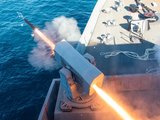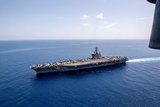Keel laid for Swedish SIGINT ship
PGZ Stocznia Wojenna has laid the keel for the new Swedish signals intelligence (SIGINT) ship at the Nauta shipyard in Gdynia, Poland, Saab announced on 15 June.
Saab received the contract to design and build the SIGINT ship from the Swedish Material Defence Administration in 2017. Subsequently it selected PGZ’s Nauta Shipyard to perform the construction, launch and early sea trials of the vessel. Before the delivery to the Swedish Navy, the ship’s final sea trials and installation of equipment will be carried out at Saab’s shipyard in Karlskrona, Sweden.
The 74m long ship will have a displacement of 2,200t and will replace the Swedish Navy’s existing HSwMS Orion launched in 1984.
Gunnar Wieslander, head of Saab Kockums, said: ‘Special purpose ships are primarily used for the interception and analysis of radio-transmitted signals and need to be highly reliable and available. Therefore you need highly skilled shipbuilders to build this kind of ship. We are very pleased with the progress of the construction process.’
More from Naval Warfare
-
![European navies line up $105.8 billion in unawarded contracts for 2026]()
European navies line up $105.8 billion in unawarded contracts for 2026
France, Germany and Italy lead the way on unawarded naval defence opportunities that could be awarded this year, but across Europe countries are ramping up their spending efforts to face geopolitical challenges.
-
![Spain’s F100 upgrade mirrors Aegis modernisation paths in allied navies]()
Spain’s F100 upgrade mirrors Aegis modernisation paths in allied navies
The Spanish Navy’s Alvaro de Bazan-class of air defence frigates will receive the latest Aegis Weapon System technology among other modernisations to extend the service life to 2045.
-
![UK’s Fleet Solid Support ship programme deemed on track despite steel supply concerns]()
UK’s Fleet Solid Support ship programme deemed on track despite steel supply concerns
Shipbuilders are saying the programme is going ahead on time as the government estimates 7.7 million tonnes of steel are needed for 2026 infrastructure projects.
-
![Raytheon unveils details of its proposal for the US Navy/NATO ESSM Next Significant Variant]()
Raytheon unveils details of its proposal for the US Navy/NATO ESSM Next Significant Variant
In an exclusive interview with Shephard, Raytheon’s VP of Shipboard Missiles disclosed what improvements the company plans to offer for the Sea Sparrow NSV.
























